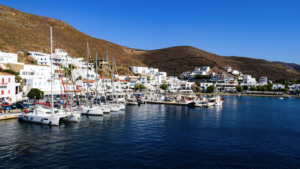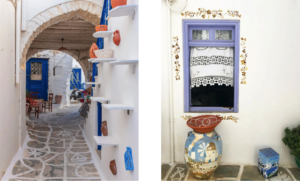In recent years, Kythnos has been dynamically entering the tourist map with very sophisticated small hotels. It is definitely not the island of all-day beach parties. Here, you will come for the tranquillity and the relaxed atmosphere.
It has preserved the authenticity of its landscape and its customs and this is what makes it stand out. So, if you want to spend your Easter days on a relaxed island, with no pretence of joy, Kythnos is your destination.
Easter in Kythnos, as in almost all of Greece, is a special affair. It promotes spirituality and inwardness and the relaxed pace of this island goes a long way to making you feel them.

Here, as in many other parts of the country, preparations for Easter start early. During Holy Week, the morning is devoted to various tasks and in the afternoon, at the first bell, people head to the church for the services.
One of the first jobs is whitewashing the outside walls of the houses and the paddocks. Then the pots are painted and the house is cleaned. At the same time, Lambria buns are made, buns are kneaded, and on Maundy Thursday, eggs are dyed and flowers are collected from yards and gardens to decorate the Epitaph in the evening, after the 12 Gospels service.
Kythnians, in fact, make their own candles for the procession of the Epitaph and the Resurrection, from natural wax, which they obtain from local beekeepers.
Now, on Holy Saturday, in the morning, pies are made. In Dryopida, they are small individual, sweet and savoury, (with local cheese, unsalted and soft – the “sour” one), eggs and dill, while in Chora they make them a little bigger, but only savoury.
In Chora, they have another special custom. After the Resurrection, the faithful are offered outside the church, in memory of their deceased relatives, the ‘συγχorio’, which is roast goat in the oven.

They then gather at home where the custom is to serve soup of goat or lamb or roast lamb in the oven.
On Easter Sunday, the menu in Kythnos is traditionally lamb or goat in the oven with lemon potatoes, although you will now see them roasting on a spit. For a solemn atmosphere, opt to follow the Epitaph procession and watch the Resurrection service, in Chora or Dryopida.
The most special custom of the island, however, is the custom of “kounia” or “mamouni” which takes place on Easter Monday in Chora. Until the mid-1970s, it was also held in Dryopida, but now only in Chora.
The custom of the “kounia” was done to formalize a relationship but also to make matchmaking in the village, to meet and flirt with the youth, as the girls sat on the swing and the young men shook them. In between the songs they sang, they would strike up a conversation.
Ask me anything
Explore related questions





